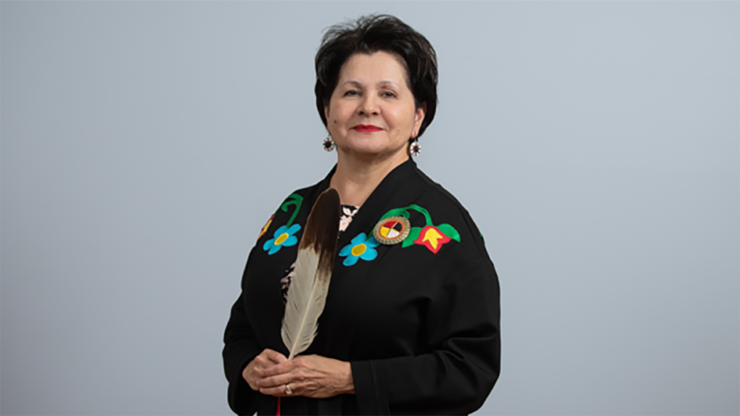Highlights include a willingness to negotiate with the PSUO-SSUO, a new mandate for the committee tackling racism on campus and allegations of additional racist instances at the U of O
It was a tense atmosphere when University of Ottawa president Jacques Frémont presented his report on Monday afternoon in front of the University of Ottawa’s Board of Governors (BOG).
Frémont first touched on a positive note for the university: the tentative agreement that they have reached on a new collective agreement with the Information Technology Professionals of the University of Ottawa (ITPUO).
He then remarked that things were much less “delightful” in regards to the negotiations between the university and the PSUO-SSUO on a new collective agreement for the support staff.
“Contrary to what you might have heard in the media, the university has always been and remains, as we speak, willing and available to discuss with the union to reach an agreement,” said Frémont to the BOG.
“In fact, we have had daily contacts with the OSSTF (the parent union of the PSUO-SSUO) bargaining team on several administrative items related to the current labour disruption, however, and I stress, the time has come to return to the table to negotiate in good faith in an attempt to find a creative solution that will bring support staff employees back to work and end the strike.”
“Our objectives are for both parties to resume bargaining in a solution-oriented approach, that is very possible. We have made significant improvements to our June offer, we [have] presented a revised offer to the PSUO-SSUO on Oct. 15 and we are available now to discuss if the union wishes to do so in a constructive way.”
“I want to stress and repeat that we dearly value our support staff and want them back to work as soon as possible.”
The U of O’s president then moved on to address the racist incidents that have occurred over the last few weeks and confirmed that a second professor had used the ‘N-word’ while teaching a class. This coincides with what undergraduate BOG student representatives Jamie Ghossein and Saada Hussen had written in their ‘Letter to the Editor’ which the Fulcrum published on Oct. 24.
“I should note we have learned about another unacceptable incident regarding the use of the ‘N-word’ with students,” he said. “Students have had obvious discomfort and were deeply affected. This will not be tolerated at the University of Ottawa and I can assure you that we will take every step needed to deal with such situations and continue to offer a safe and respectful teaching and learning environment.”
Frémont also agreed that the President’s Advisory Committee on Anti-Black Racism should be reformed to an action-based committee; an idea that was laid out in the ‘Letter to the Editor’ by Hussen and Ghossein.
“I completely agree with Board members Saada Hussen and Jamie Ghossein in their statement that the current advisory committee’s work has not been satisfactory. Together, we can change this. I am committed to this change and to transform it into a committee of action,” said the president.
The letter from Hussen and Ghossein on Oct. 24 directly requested “The President’s Advisory Committee on Anti-Black Racism be reformed to an action-based committee with binding authority on recommendations, and that this committee be attended by members of central administration capable of enacting change.”
During the question period, Ghossein thanked Frémont for his commitment to transition the committee to an action-based committee but said he was “deeply disappointed not only with the initial response from the university but also from a lot of members of our community.”
The student representative pointed the finger at both the Association of Part-Time Professors of the University of Ottawa (APTPUO) and the Association of Professors of the University of Ottawa (APUO). Ghossein claimed as he did in the ‘Letter to the Editor’ that the BIPOC caucus of the APUO had not been contacted when they released a statement “in support of the professor who made the initial comment.”
He also spoke of other racist incidents that took place since Verushka Lieutenant-Duval utterance of the ‘N-word,’ a story that the Fulcrum broke back on Oct.2.
According to Ghossein, there were Black students that were told online they do not belong at the university because they opposed the use of the ‘N-word,’ a racialized staff member was victim of a hate crime which is under investigation by the Ottawa Police Service and printers at Roger Guindon were hacked and continuously printed racial remarks this weekend, forcing the faculty to instruct everyone to unplugged their printers to make it cease.
“This is what occurs when we cannot unequivocally denounce these incidences on campus, we have seen the use of the ‘N-word’ not only become harassment but also violence in the form of a hate crime,” said Ghossein. “This is why we highlight the importance of unequivocally denouncing these acts but also working on a committee and a system that we can tackle these different issues on campus. We really look forward to seeing how we can transform our campus to make it more accommodating for everyone on campus.”
Elder Claudette Commanda then took the floor to share her worries about incidents of racism at the university towards Indigenous students. According to Commanda, there have been many instances of Indigenous students and professors being called racial slurs at the U of O.
“I can tell you from my own experience as a First Nations professor at the University of Ottawa, I’ve been subjected to some very racist comments from students,” said Commanda. “Many, many times our Indigenous students have raised how often that in a classroom setting they have been called the ‘S-word’ by professors and other students.”
“We need to ensure that our Indigenous students have that safe and secure place as well.”
“Yes, there’s academic freedom, there’s freedom of expression, but that many times it hurts and we have to think about how painful it is for people, people with these lived experiences. We need action and we need to do it now.”
“I truly do believe that the action-based committee is the one that needs to rule on this, absolutely, and I am hoping on this advisory committee that there will be Indigenous people that will be sitting on this committee because we [have] to do this together.”
“We have to have this united collective voice to combat this racism.”
The new 2020-21 budget was also passed at the BOG with consolidated losses of $33 million compared to the $65.5 million loss predicted back in May. The full audio from the Oct. 26 BOG reunion can be found here.





